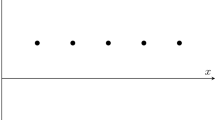Abstract
In this discussion, I point out that Max Black offers not one but two arguments against the (logical/metaphysical) possibility of backwards causation. Although both arguments fail in their intended aim, they show something important, viz., that defenders of backwards causation should understand Black’s Houdini example (and others like it) in terms of the “multiple causes” model.
Access this chapter
Tax calculation will be finalised at checkout
Purchases are for personal use only
Similar content being viewed by others
Notes
- 1.
Neither ‘bilk’ nor ‘bilking’ (nor any cognate words) appear in Black’s article. The term was first introduced into the philosophical lexicon by Antony Flew two years earlier. See Flew (1954, 57).
- 2.
Black’s discussion in this paragraph and elsewhere is compromised by his failure to distinguish event-tokens from event-types. However, I assume that this can easily be rectified. What Black finds absurd is the idea that A-type events are sometimes caused by T-type events and sometimes not.
- 3.
Clearly this doesn’t follow. If an A-type event is not caused by a later T-type event, it doesn’t follow that it wasn’t caused by an earlier or later event (i.e., that it was either uncaused or caused by a simultaneous event). It might have been caused by another later event. That is the main point of the present chapter.
- 4.
I put to one side the outre possibility that Houdini’s pronouncements, when there is no later coin toss, are uncaused and, hence, inexplicable. This may be a metaphysically possibility, but it would require even stranger laws than those envisaged above.
- 5.
This would, e.g., rule out as impossible the time travel stories beloved of philosophers.
- 6.
See, e.g., Price (1996, 171–174).
References
Black, M. (1956). Why cannot an effect precede its cause? Analysis, 16(3), 49–58.
Flew, A. (1954). Can an effect precede its cause? Proceedings of the Aristotelian Society, 28, 45–62.
Price, H. (1996). Time’s arrow and Archimedes’ point. Oxford: Oxford University Press.
Author information
Authors and Affiliations
Editor information
Editors and Affiliations
Rights and permissions
Copyright information
© 2022 The Author(s), under exclusive license to Springer Nature Switzerland AG
About this chapter
Cite this chapter
Garrett, B., Joven Joaquin, J. (2022). Max Black and Backward Causation. In: Joaquin, J.J. (eds) Time, Identity and the Self: Essays on Metaphysics. Synthese Library, vol 442. Springer, Cham. https://doi.org/10.1007/978-3-030-85517-8_3
Download citation
DOI: https://doi.org/10.1007/978-3-030-85517-8_3
Published:
Publisher Name: Springer, Cham
Print ISBN: 978-3-030-85516-1
Online ISBN: 978-3-030-85517-8
eBook Packages: Religion and PhilosophyPhilosophy and Religion (R0)




